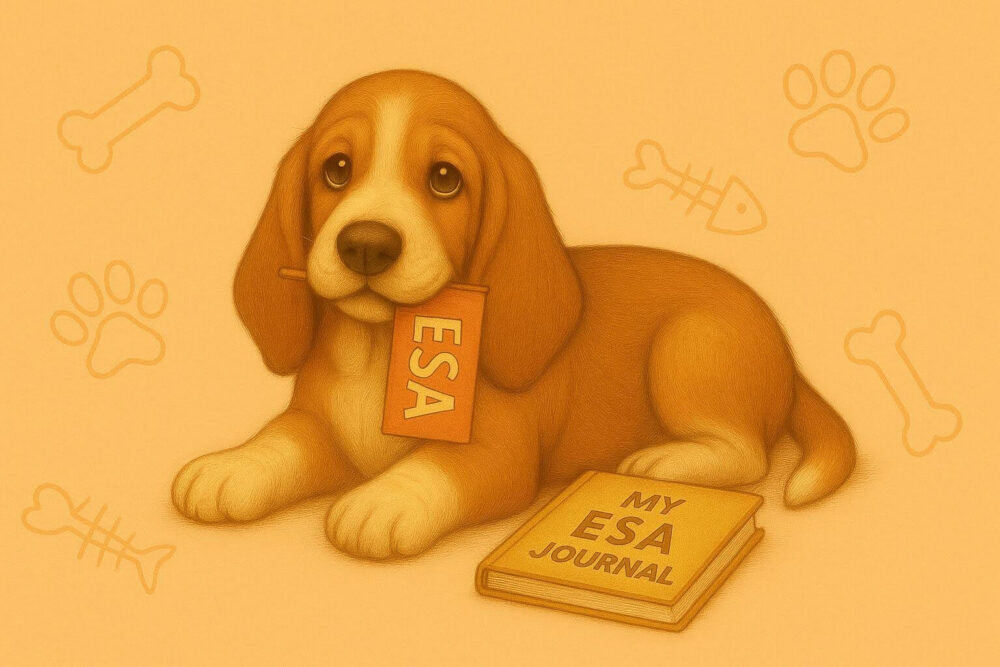
Table of Contents
You’ve finally got a dog that helps you feel human again. But then, your landlord says it’s too big, too scary, or just not the “right breed.” Now what?
“Can a landlord refuse an emotional support dog based on breed?” is a question that keeps countless ESA owners up at night, especially those with breeds that typically make the “restricted” list.
But you don’t have to worry. Federal housing laws have clear rules about this, and they’re firmly on your side. This guide will cut through the confusion, explain your rights, and help you get approved easily without facing rejection.

What Dog Breed Restrictions Actually Mean
Breed restrictions are policies landlords and cities use to prohibit certain dog breeds from living in rental properties as pets. They do this because of insurance pressures, safety concerns, and local regulations or ordinances.
These restrictions mostly target breeds typically perceived as “dangerous” or “aggressive,” like:
- Pit bulls
- Rottweilers
- German shepherds
- Dobermans
- Cane corsos
- American bulldogs
- Chow chows
Bans aren’t always about behavior, though. The dog’s size (think a towering Great Dane) or high energy levels (hello, huskies!) can also land them on the no-go list. Some cities enforce breed-specific laws (BSL), while others prohibit certain breeds entirely. And it’s not just dogs, either. Some rentals may restrict “exotic” pets like snakes, large birds, or pigs.
Can a Landlord Deny an Emotional Support Animal Based on Breed?
No, landlords can’t refuse your emotional support dog based on breed. But to understand the nuances, we need to look at what the law says.
The Fair Housing Act (FHA) draws a crystal-clear line between regular pets and ESAs. While all pets offer companionship, an ESA serves a medical purpose by helping ease the symptoms related to your mental or emotional condition.
So, all those breed restrictions we talked about only apply to regular pets, not ESAs. In fact, ESAs are protected from more than just breed discrimination under the FHA. Here’s what that means:
- Landlords have to accept ESA dogs even in pet-free buildings
- They can’t charge you pet deposits or monthly pet rent
- They can’t impose limits on the number of ESAs you have
To legally turn your “restricted pup” into an emotional support dog, the FHA requires a signed ESA letter from a licensed mental health professional (LMHP). So go ahead, let your pit bull crash on the couch—just make sure their paperwork is in order!
When Can a Landlord Legally Reject an ESA Dog?
While landlords generally can’t deny an ESA based on breed alone, there are a few exceptions where a landlord can say no to an emotional support dog, and these are:
- Direct threat to others: If your dog has a history of aggression toward people, like biting neighbors, excessive barking, or showing unprovoked aggressive behavior
- Significant property damage: If your dog treats drywall like a Michelin-starred snack and your floors like a scratch-art project. Occasional accidents don’t count; we’re talking Picasso-level destruction beyond normal wear and tear
- Undue financial burden: If accommodating your ESA would cause significant financial hardship to the landlord, like retrofitting a tiny studio for a large dog or making structural changes that would bankrupt a small property owner
- Invalid or fraudulent documentation: If your ESA letter isn’t from a licensed mental health professional or doesn’t meet legal requirements. No, those sketchy templates you can buy online for $50 don’t make the cut
Still, the burden of proof is always on the landlord. Before they can legally deny or evict your ESA, they must provide concrete, documented evidence that your dog causes problems. They can’t do so just because they’re scared of German shepherds.
How To Respond to Breed Discrimination
Even with properly documented and well-behaved ESA dogs, some landlords still try to enforce illegal breed restrictions. But while getting turned away feels like a punch to the gut, especially when you know you’re following all the rules, the law is on your side.
The U.S. Department of Housing and Urban Development (HUD) is the federal agency that enforces the FHA, and it’s pretty strict regarding ESA-related discrimination.
You can file a complaint with the HUD online, by mail, or by phone, and they’ll investigate your case thoroughly. They’ll work to resolve the issue with your landlord through mediation or other enforcement actions. When landlords refuse to cooperate, HUD can pursue legal action on your behalf, including filing lawsuits in federal court.
Landlords who wrongfully reject legitimate ESAs can face severe penalties and legal consequences, including hefty fines (up to $16,000 for a first violation), court-ordered policy changes, and having to pay damages to tenants they discriminated against.
The Best Way To Avoid Breed Discrimination Hassles: Getting Bulletproof ESA Documentation
Let’s face it—some landlords act like your pit bull is secretly auditioning for Jurassic Park, when in reality, you know it’s a complete snuggle bug. The best way to shut down breed bias is a legally ironclad ESA letter that even the most stubborn landlord can’t argue with.
When your paperwork is legitimate, breed restrictions become someone else’s problem to figure out. Here’s how to get ESA documentation that holds up:
- Schedule an appointment with an LMHP
- Get professionally diagnosed
- Receive an official ESA letter
- Share the letter with your landlord
Schedule an Appointment With an LMHP
ESA letters are only valid when issued by a qualified LMHP in your state, so your first move is to find the right professional. This could be a:
- Licensed therapist
- Psychiatrist
- Psychologist
- Licensed clinical social worker
- Primary care physician
If you already have a therapist or counselor, start there. They know your mental health history and can easily connect the dots between your condition and the ways your dog helps you cope.
Don’t have a current provider? No problem. You can find LMHPs through your insurance network, local mental health clinics, or reputable online platforms. Just make sure your chosen provider is actually licensed in your state to comply with local laws.

Get Professionally Diagnosed
During the assessment, the LMHP will ask you questions about your symptoms to determine whether you have a qualifying condition outlined under the DSM-5-TR manual, such as:
- Anxiety
- Depression
- PTSD
- Bipolar disorder
- ADHD
- Autism
- Schizophrenia
The professional will also ask about your relationship with your dog to see how it helps manage your symptoms. They won’t judge your choice of breed; they’ll focus on your therapeutic needs. Whether you have a tiny Chihuahua or a full-sized mastiff, what matters is the emotional support it provides.
The process works the same whether you see a therapist in person or virtually. In fact, online sessions offer some serious advantages—no commute, quicker appointments, and often more affordable options.
Receive an Official ESA Letter
If your evaluation goes well, you’ll get an official ESA letter that’s worth its weight in gold. This document should be printed on your provider’s professional letterhead and include these elements:
- The LMHP’s state license number, National Provider Identifier (NPI), signature, and contact details
- Confirmation of your mental health condition (without going into specifics)
- A statement that your emotional support dog alleviates symptoms
- Recommendation for housing accommodation under the FHA
It’s basically your dog’s passport to protected housing status. You don’t need any other ESA registrations, certifications, or IDs to make your ESA official. Neither the FHA nor the HUD recognizes any of these as valid ESA documentation.
Share the Letter With Your Landlord
Once you have your ESA letter, notify your landlord in writing. If you’re already living somewhere, provide the letter as soon as you receive it. If you’re apartment hunting, you can wait until after your application is approved to avoid any unconscious bias during the selection process.
Your landlord might have questions, especially if your dog is one of those “dangerous” breeds. If this happens, answer politely, stay calm, and refer them back to the letter and the FHA. They can contact your LMHP for verification, but they can’t demand additional details about your condition or require you to fill out additional forms.
Of course, this whole process only works if your ESA letter is genuine and legally compliant. Landlords are getting savvier about spotting questionable documentation, and the last thing you want is to have your letter rejected because it came from a shady provider.
That’s where Your Service Animal comes in. This online platform connects you with vetted LMHPs who know their way around ESA laws and are experienced in issuing ESA letters, taking the guesswork out of the entire process.
How Your Service Animal Gets Your ESA Approved Fast
Instead of dealing with a complicated, drawn-out process that adds to your housing stress, Your Service Animal streamlines the procedure into something you can complete from home. No shady online certificates, no fine print—just 100% legitimate documentation that holds up, even if your dog is a typically restricted breed.
Here’s how Your Service Animal makes ESA approval fast and hassle-free:
| YSA’s Benefit | What It Means for You |
| Free 3-minute pre-qualification quiz | Find out if you qualify before spending a dime, because no one likes surprises when housing is on the line |
| Convenient remote process | Get your letter without leaving home; perfect when local providers don’t understand ESA housing laws |
| Fully compliant letters | Your letter comes from a real LMHP familiar with your state’s ESA laws. That means no loopholes for landlords to exploit, even with breed restrictions |
| Fast turnaround | Receive your letter within 24–48 hours of approval—crucial when facing housing deadlines or breed-based rejections |
| 100% money-back guarantee | If you don’t get a letter or your landlord wrongfully rejects it, you get a full refund |
Get an ESA Letter in 4 Easy Steps
Ready to shut down breed discrimination and landlord drama? Your ESA protections start here:
- Find out if you’re a good fit for an ESA letter with our online quiz
- Schedule an online appointment with a licensed mental health practitioner in your state
- Attend the online call and receive your ESA letter if clinically appropriate
- Receive a full refund if the therapist doesn’t issue an ESA letter or your landlord rejects your letter








